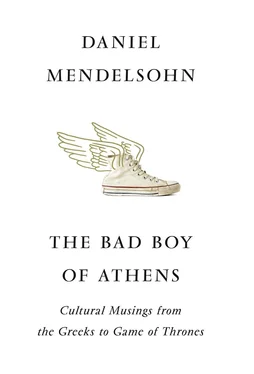By the Middle Ages, nearly everything had disappeared. As with much of classical literature, texts of her work existed in relatively few copies, all painstakingly transcribed by hand; as the centuries passed, fire, flood, neglect, and bookworms – to say nothing of disapproving Church Fathers – took their devastating toll. Market forces were also at work: over time, fewer readers – and fewer scribes – understood Aeolic, the dialect in which Sappho composed, and so demand for new copies diminished. A twelfth-century Byzantine scholar who had hoped to write about Sappho grumbled that ‘both Sappho and her works, the lyrics and the songs, have been trashed by time’.
Until a hundred years ago or so, when papyrus fragments of her poems started turning up, all that remained of those ‘white columns of Sappho’s song’ was a handful of lines quoted in the works of later Greek and Roman authors. Some of these writers were interested in Lesbos’ most famous daughter for reasons that can strike us as comically arcane: the only poem that has survived in its entirety – a playful hymn to Aphrodite in which the poet calls upon the goddess to be her ‘comrade in arms’ in an erotic escapade – was saved for posterity because the author of a first-century-BC treatise called ‘On the Arrangement of Words’ admired her handling of vowels. At present, scholars have catalogued around two hundred and fifty fragments, of which fewer than seventy contain complete lines. A great many consist of just a few words; some, of a single word.
The common theme of most ancient responses to Sappho’s work is rapturous admiration for her exquisite style, or for her searing content, or both. An anecdote from a later classical author about the Athenian legislator Solon, a contemporary of Sappho’s and one of the Seven Sages of Greece, is typical:
Solon of Athens, son of Execestides, after hearing his nephew singing a song of Sappho’s over the wine, liked the song so much that he told the boy to teach it to him. When someone asked him why he was so eager, he replied, ‘so that I may learn it and then die’.
Plato, whose attitude toward literature was, to say the least, vexed – he thought most poetry had no place in the ideal state – is said to have called her the ‘Tenth Muse’. The scholars at the Library of Alexandria enshrined her in their canon of nine lyric geniuses – the only woman to be included. At least two towns on Lesbos vied for the distinction of being her birthplace; Aristotle reports that she ‘was honoured although she was a woman’.
All this buzz is both titillating and frustrating, stoking our appetite for a body of work that we’re unable to read, much less assess critically; imagine what the name Homer would mean to Western civilization if all we had of the Iliad and the Odyssey was their reputations and, say, ninety lines of each poem. The Greeks, in fact, seem to have thought of Sappho as the female counterpart of Homer: he was known as ‘the Poet’, and they referred to her as ‘the Poetess’. Many scholars now see her poetry as an attempt to appropriate and ‘feminize’ the diction and subject matter of heroic epic. (For instance, the appeal to Aphrodite to be her ‘comrade in arms’ – in love.)
The good news is that the surviving fragments of Sappho bear out the ancient verdict. One fine example is her best-known verse, known to classicists as Fragment 31, which consists of four sapphic stanzas. (They appear below in my own translation.) These were singled out by the author of a first-century-AD literary treatise called ‘On the Sublime’ for the way in which they ‘select and juxtapose the most striking, intense symptoms of erotic passion’. Here the speaker expresses her envy of the men who, presumably in the course of certain kinds of social occasions, have a chance to talk to the girl she yearns for:
He seems to me an equal of the gods –
whoever gets to sit across from you
and listen to the sound of your sweet speech
so close to him,
to your beguiling laughter: O it makes my
panicked heart go fluttering in my chest,
for the moment I catch sight of you there’s no
speech left in me,
but tongue gags –: all at once a faint
fever courses down beneath the skin,
eyes no longer capable of sight, a thrum-
ming in the ears,
and sweat drips down my body, and the shakes
lay siege to me all over, and I’m greener
than grass, I’m just a little short of dying,
I seem to me;
but all must be endured, since even a pauper …
Even without its final lines (which, maddeningly, the author of the treatise didn’t go on to quote), it’s a remarkable work. Slyly, the speaker avoids physical description of the girl, instead evoking her beauty by detailing the effect it has on the beholder; the whole poem is a kind of reaction shot. The verses subtly enact the symptoms they describe: as the poet’s faculties fail one by one in the overpowering presence of her beloved, the outside world – the girl, the man she’s talking to – dissolves and disappears from the poem, too, leaving the speaker in a kind of interior echo chamber. The arc from ‘he seems to me’ in the first line to the solipsistic ‘I seem to me’ at the end says it all.
Even the tiniest scraps can be potent, as Rayor’s plainspoken and comprehensive translation makes clear. (Until now, the most noteworthy English version to include translations of virtually every fragment was ‘If Not, Winter’, the 2002 translation by the poet and classicist Anne Carson.) To flip through these truncated texts is a strangely moving experience, one that has been compared to ‘reading a note in a bottle’:
You came, I yearned for you,
and you cooled my senses that burned with desire
or
love shook my senses
like wind crashing on mountain oaks
or
Maidenhood, my maidenhood, where have you gone
leaving me behind?
Never again will I come to you, never again
or
Once again Love, that loosener of limbs,
bittersweet and inescapable, crawling thing,
seizes me.
It’s in that last verse that the notion of desire as ‘bittersweet’ appears for the first time in Western literature.
The very incompleteness of the verses can heighten the starkness of the emotions – a fact that a number of contemporary classicists and translators have made much of. For Stanley Lombardo, whose Sappho: Poems and Fragments (2002) offers a selection of about a quarter of the fragments, the truncated remains are like ‘beautiful, isolated limbs’. The late Thomas Habinek, a classicist at the University of Southern California, nicely summed up this rather postmodern aspect of Sappho’s appeal: ‘The fragmentary preservation of poems of yearning and separation serves as a reminder of the inevitable incompleteness of human knowledge and affection.’
In Sappho’s biography, as in her work, gaps predominate. A few facts can be inferred by triangulating various sources: the poems themselves, ancient reference works, and citations in later classical writers who had access to information that has since been lost. The Suda , a tenth-century Byzantine encyclopedia of ancient culture, which is the basis of much of our information, asserts that Sappho ‘flourished’ between 612 and 608 BC; from this, scholars have concluded that she was born around 640. She was likely past middle age when she died, since in at least one poem she complains about her greying hair and cranky knees.
Although her birthplace cannot be verified, Sappho seems to have lived mostly in Mytilene, the capital of Lesbos. Just across the strip of water that separates Lesbos from the mainland of Asia Minor (present-day Turkey) was the opulent city of Sardis, the capital of Lydia. Some classicists have argued that the proximity of Lesbos to this lush Eastern trading hub helps to explain Sappho’s taste for visual gorgeousness and sensual luxury: the ‘myrrh, cassia, and frankincense’, the ‘bracelets, fragrant / purple robes, iridescent trinkets, / countless silver cups, and ivory’ that waft and glitter in her lines, often in striking counterpoint to their raw emotionality.
Читать дальше












